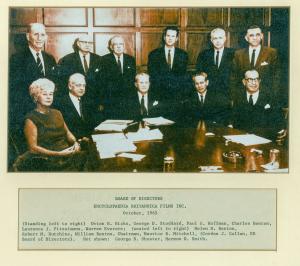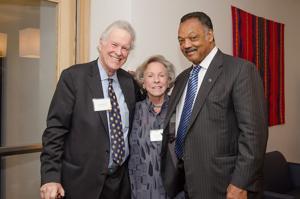Charles William Benton is born February 13, 1931 in New York to Helen Hemingway Benton and William Benton, then head of the Benton & Bowles advertising agency.
Marjorie Scott Craig is born July 26, 1933 in Philadelphia, PA, the last of seven children of Edith Kinkaed Craig and James Henry Craig.
In the late 1930’s and early 1940’s, Helen and William Benton adopt two girls, Helen and Louise, and one boy, John, from The Cradle in Evanston, Illinois.
Marjorie enters Connecticut College for Women. To earn college funds over her Freshman and Sophomore years, she works as a waitress, drives an ambulance, and models underwear. (Her staunchly conservative Irish father, a textile salesman for several Irish linen mills, never knew.) She meets Charles Benton, then a junior at Yale, her freshman year. "Charles and I met on a blind date while I was working on Adlai Stevenson's and Senator William Benton's campaigns--before I could even vote! Little did I know I would turn around a year and a half later and marry the Senator's son!”
Charles graduates with a B.A. from Yale University.
Charles marries Marjorie Craig, 19, a student at Connecticut College for Women. “My father damned near died when I brought home a Democrat to marry,” says Marjorie. “He thought that William Benton and Charles Benton were ‘pinkos,’ as he would say. They have three children: Adrianne (1955), Craig (1957), and Scott (1958-2005).
Charles begins a long career in the production and distribution of films and television programs—first with Encyclopaedia Britannica Films, Inc. (1953-1967). When Charles flies to Washington on his 21st birthday to have dinner with his father, Senator Benton "folded in" [a favorite family term] the actor Frederic March. It is at that dinner that Charles tells his father that he wants to be a teacher. "He looked stunned," remembered Charles. "Then he asked if I had thought about going into education films [part of the family business]. 'You can reach many more people that way,' he added." Charles agreed to try it for a year and stayed for 14 years. "At Encyclopaedia Britannica, Charles took a territory in downstate Illinois as a salesman, marketing Britannica films to schools and libraries. For his two years on the job, he was top salesman [out of 40]. 'It was the first time I knew I had the stuff, that I wasn't just the old man's son,' he says. 'In downstate Illinois, my name didn't make any difference.'"
Charles serves as trustee of educational institutions, including the National College of Education (1964-1970), the historically black university, the Hampton Institute (1965-1979), and his father’s beloved University of Chicago (1965-1984).
Marjorie goes back to school and graduates college with a B.S. in political science from the National College of Education. After working in local Democratic politics, she moves onto the national political scene working as a major fundraiser for Senator George McGovern in his bid for the 1972 Presidency. Also that year, she is a first time delegate to the Democratic National Convention.
Charles leaves Encyclopaedia Britannica Films, Inc. to head his own company, Public Media, Inc. (1968-2005), which specializes in distribution of programs to civic, cultural, and educational institutions. His daughter, Adrianne, runs a division of Public Media, Inc. called Home Vision Entertainment, which distributes DVDs of classic and independent films to the home market, until she sells the family business in 2005 to a competitor in advance of the streaming revolution.
Charles serves on the board of the William Benton Foundation, and is its President from 1975-1979 after the death of his father in 1973. Senator Benton wanted the Foundation to concentrate its efforts in the “in the area of communications” with the “most urgent and significant of the projects... those which promise to affect political activities within the United States…”
The William Benton Foundation grants $200,000 to the League of Women Voters Education Fund to support the 1976 Presidential Forum Project, which funds a five-part series of town meetings televised by PBS during the Presidential primaries. “It is particularly fitting that in the first national election after my father’s death we should be able to join with the League in making this series of five national political Forums possible,” said Charles.
That Presidential Forum project leads to the televised presidential debates sponsored by the League later in 1976—the first such event since the Nixon-Kennedy debates of 1960.
In the late 1970’s, Marjorie is disillusioned with what she feels is the Federal Government’s flagging commitment to arms control. That discouragement leads her to channel her energies into more viable anti-war activities. During the Carter administration, she serves in a number of posts at the United States Mission to the United Nations, where she, along with actor Paul Newman, are delegates to the Special Session on Disarmament. Actively involved in international peace work, Marjorie also is the co-chair of the Americans for SALT (Strategic Arms Limitation Treaty).
President Jimmy Carter appoints Charles to the National Commission on Libraries and Information Services (NCLIS) Board, where he serves as Commissioner from 1978-1985; and as Chairman from 1978-1982. A unanimous vote of NCLIS Commissioners elects Charles its Chairman Emeritus in 1985.
In February 1979, Marjorie helps to organize a demonstration of 2,000 people outside a military arms dealers’ convention being held in a Chicago suburb. A February 12, 1979 Time Magazine article quotes Marjorie, “This is not a dog show, not a boat show. It's a military hardware show where they'll be selling everything from thumbscrews to missiles." When she appears in a newspaper photograph with the sign, “No More Arms Bazaar,” the maker of that sign, Mark Rogovin, calls her and they go on to co-found The Peace Museum in Chicago in 1981.
Charles serves as Chairman of the first White House Conference on Library and Information Services.
President Jimmy Carter appoints Marjorie U.S. Representative to UNICEF, where she continues under the Reagan administration until 1983. Much of Marjorie’s life is spent improving the lives of women and children around the world. Marjorie serves as Board Chair of Save the Children Federation and the Chapin Hall Center for Children at the University of Chicago, and for 25 years, is a Trustee of the Bernard Van Leer Foundation and Van Leer Group in the Netherlands. These roles take her all over the world, including to the 1982 famine in Ethiopia, to Pakistan and Afghanistan, to Gaza, to South Africa, to Central America, and more.
'I've been asked to run for political office,' Marjorie says. 'I think I'm probably more the appointive type; this big mouth with the four-letter words wouldn't serve too well in elective office....I don't think I could hedge issues like you have to.'
Charles continues on the Advisory Board for the Education Fund, League of Women Voters Presidential Debates, in 1980 and 1984, and on the Advisory Board, Commission on Presidential Debates, in 1988.
Charles founds the Benton Foundation, with offices in Washington D.C. and Evanston, Illinois, as the legacy of his father, who in his will hands down the foundation’s mission of “good works in communications” and $8 million in Encyclopaedia Britannica stock to support the organization. Marjorie serves as Trustee and daughter Adrianne joins the Board as Secretary. Charles serves as Chairman until his death in 2015.
Marjorie co-founds The Chicago Foundation for Women, a public foundation giving funds it raises to women’s and girls’ programs. One of its goals is to help women gain a sense of power over money and transform themselves from volunteers to philanthropists.
President Clinton appoints Marjorie as the Chair of the President’s Commission on White House Fellowships. She serves in that position until 2001.
The Council on Foundations elects Marjorie as chair of the Board of Directors (1994-1996).
President Clinton appoints Charles as a member of the Presidential Advisory Committee on the Public Interest Obligations of Digital Television Broadcasters. The Commission recommends public interest obligations for those digital television broadcasters who have been given $100 billion worth of spectrum to transition away from traditional, analog TV. Charles Benton serves on that committee until 1998. In 2005, the Benton Institute publishes a Citizen's Guide to the Public Interest Obligations of Digital Television Broadcasters in advance of the nation's 1600 television stations converting from traditional analog technology to a digital television format.
Charles receives The Manship Prize for Exemplary Use of Media Technology from Louisiana State University’s Manship School of Mass Communication.
Marjorie receives the U.S. Office of Personnel Management Award for Meritorious Service, Clinton/Gore Administration.
The Council on Foundations awards its Distinguished Grantmaker Award to Charles and Marjorie Benton, “longtime activists in the foundation world.”
Marjorie joins the board of Partners in Health, whose mission is to provide free medical care in eleven countries around the world. She chooses to work in Haiti, and with many others, she has been responsible for the building of a women’s clinic in Lascahobas, a small hospital in LaColline, and a major new teaching hospital in Mirebalais. She is now a Senior advisor to Paul Farmer and Partners in Health.
Marjorie joins the Governing Board of the Bulletin for Atomic Scientists. Julia Stasch, President of the MacArthur Foundation, gives Marjorie an award at the Bulletin’s 70th anniversary dinner.
The Alliance for Public Technology honors Charles Benton with the Susan G. Hadden Pioneer Award for “pioneering efforts in telecommunications and consumer access.”
Charles Benton asks President Bush for a national broadband strategy to guarantee universal, affordable communications access for all Americans.
As Vice-Chairman and Chairman of the Partnership for a Connected Illinois (PCI) from 2010-2014, Charles is intimately involved in the state of Illinois’ strategies to take advantage of federal American Recovery and Reinvestment Act (ARRA) broadband stimulus funds. A $6.5 million grant to PCI focuses on (1) mapping and data services, (2) outreach and leadership to communities, (3) research to facilitate adoption and use, (4) demonstration projects, and (5) conferences and meetings. On April 6, 2016, PCI gives Charles a posthumous award inscribed “Friend, Mentor, and Advocate for the Public Interest.”
The United Church of Christ Office of Communications, Inc. gives the Everett C. Parker Award to Charles in recognition of his "many years of leadership and support for promoting the public interest in traditional and digital media."
Ruth Bader Ginsburg administers the oath of office to eight new members of the National Museum and Library Services (IMLS) board appointed by President Barack Obama, including Charles Benton. This appointment is the culmination of a long career serving the nation’s museums and libraries including serving on the boards of the Illinois Arts Council, American Federation of the Arts, the Heard Museum (Phoenix), the Art Institute of Chicago, the Field Museum of Chicago, the Illinois Humanities Council, and the National Film Preservation Foundation, as well as Charles' National Commission on Libraries and Information Services tenure.
Charles Benton dies at age 84 of complications from renal cancer.



























